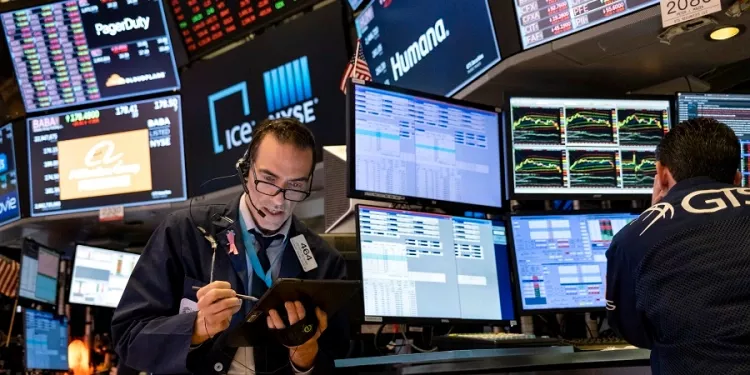It was another bearish week for U.S. stocks as the major indexes suffered weekly declines following the Federal Reserve’s decision to increase interest rate by 0.50% to 1%, the highest since the year 2000.
The New York Stock Exchange (NYSE) All Share Index (ASI) lost 0.31% for the week representing its 6th week of consecutive decline. It opened, trading at 15615.25 basis points and it closed the week trading at 15566.56 basis points. Although the week started bullish for the NYSE in the first three days, Thursday and Friday’s market declines were enough to reverse three days of gains.
The NASDAQ posted its 5th week of decline, losing 1.54% during the week under consideration. It started at a basis point of 12,331.69 and ended the week at 12,144.66 basis points. The week in question saw a decline in the volume of transactions against the previous week by 17.63% as the market recorded a volume of 897.83 million.
The Dow Jones and the S&P 500 also posted declines, 0.23% and 0.21% respectively. The Dow Jones is on its 6th week of decline while the S&P 500 is on its 5th week of market downturn.
What’s moving the market?
The stock market finished the first week of May with modest losses that masked a turbulent performance that saw the Dow Jones Average post both its best and worst days since 2020. The three major indexes started the week with three straight positive sessions, then plunged in a sharp selloff after investors decided the Federal Reserve’s implied policy tightening cycle ahead was still very hawkish, even as Chairman Jerome Powell took 75-basis point rate hikes off the table.
Investors remain nervous about the Fed’s ability to tighten financial conditions to combat inflation at 40-year highs without knocking the economy into a recession. As previously mentioned, the Dow Jones Average lost only 0.2% for the week but it was still the sixth straight declining week for the index, while the S&P 500 also fell 0.2% and the tech-heavy Nasdaq Composite slumped 1.5%, closing nearly 25% below its record high from last November.
Also weighing in on the market was the European Commission, the executive arm of the EU, unveiling new sanctions on Russian energy, including a phase-out of crude oil imports within six months and refined products by the end of the year.
Brent oil futures, the global benchmark, climbed as much as 5% after the news on Wednesday, while WTI crude futures, the U.S. benchmark, advanced 4% to over $108 per barrel. The EU also proposed that Sberbank, Russia’s largest financial institution, and two other major banks be disconnected from the SWIFT international payment system, while “three big Russian state-owned broadcasters will be barred from EU airwaves.”
Market optimism continues to evaporate as headlines from the war and bad earnings continue to roil investing sentiment. While there have been some relief rallies in recent sessions, particularly the first three trading days of the week, in what some dub capitulation trades or a dead cat bounce, those have done little to affect the overall equity trade which has turned sour since the start of 2022.
In its biggest one-day loss in two years, the benchmark S&P 500 Index plunged 3.6% on Thursday, the Dow lost 1,063 points and the tech-heavy Nasdaq closed the trading session down 5%.
The U.S. Labor Department presented stronger-than-expected jobs data with nonfarm payrolls increasing by 428,000 jobs in April, versus expectations of 391,000 job additions, underscoring the economy’s strong fundamentals despite a contraction in gross domestic product in the first quarter. The unemployment rate remained unchanged at 3.6% in the month, while average hourly earnings increased 0.3% against a forecast of a 0.4% rise.
Many tech firms and other companies have embraced remote work during the pandemic, only to wean off the model in favour of a hybrid approach or a return to the office once the initial waves of COVID-19 subsided. Not Airbnb. The home rental provider that changed the way people travel announced a policy this week that will allow its employees to live and work from anywhere, calling it the “predominant way companies will work in 10 years from now.”
Megacap growth stocks slipped, with a few exceptions including Apple Inc, which rose 0.5%. Wells Fargo & Co declined 0.5% to lead losses among big banks. Under Armour Inc slumped 23.8% after the sportswear maker forecast downbeat fiscal 2023 profit. Shares of rival Nike Inc also slipped. Coinbase Global Inc dropped 9% on Friday to the lowest level since the cryptocurrency exchange’s 2021 stock market debut.
Materials were also a big drag on the broader market, led by Vulcan Materials, Corteva and Ball Corporation, with the latter down more than 6% following negative commentary on the stock from Wall Street.
Peloton Interactive slipped 6% following a Wall Street Journal report that the connected fitness equipment company is looking to sell a 15% to 20% stake to bolster its balance sheet.




